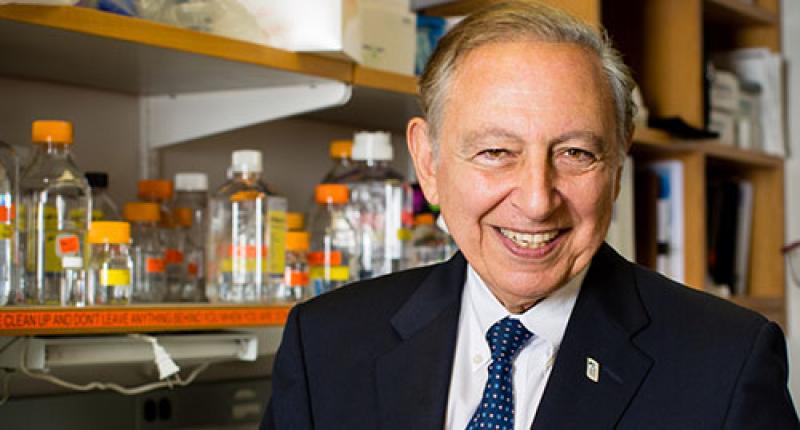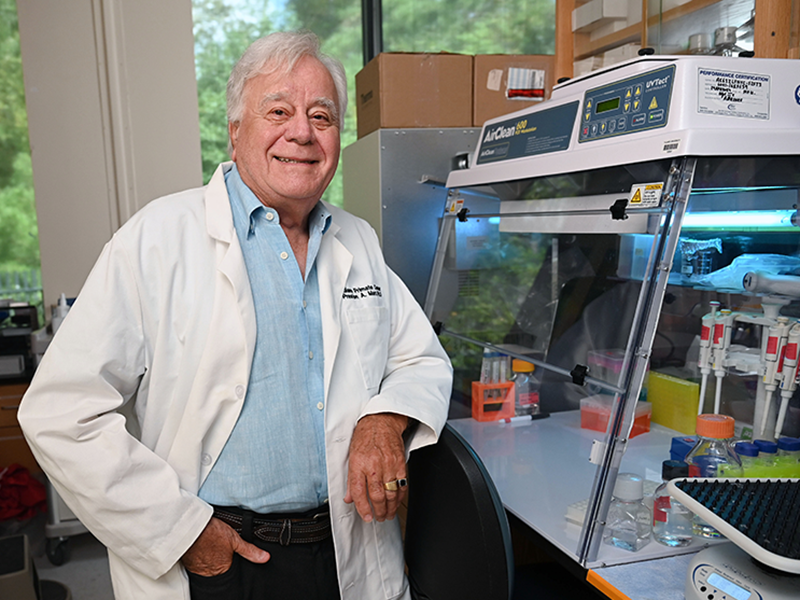
Robert C. Gallo, MD
University of South Florida Health Morsani College of Medicine
University of South Florida Health Virology Center
The symposium begins with a welcome reception on the evening of Tuesday, October 22, featuring a keynote talk by acclaimed AIDS researcher Robert C. Gallo, MD. Dr. Gallo received his MD from Jefferson Medical College in 1963, followed by a Clinical Clerkship at Yale University School of Medicine. He completed his residency at the University of Chicago in 1965. Dr. Gallo is recognized internationally for his co-discovery of HIV as the cause of AIDS. He has spent much of his career working to eliminate AIDS and other viral chronic diseases.
Before the AIDS epidemic, Dr. Gallo was the first to identify a human retrovirus and the only known human leukemia virus (HTLV). In 1996, Science magazine hailed his discovery that a natural compound known as chemokines can block HIV and halt the progression of AIDS as one of the year's most important scientific breakthroughs. That same year, Dr. Gallo co-founded the Institute of Human Virology at the University of Maryland School of Medicine. To this day, the IHV team sustains a program supporting scientific research and clinical care and treatment for people living with HIV/AIDS. They have provided care for over 5,000 patients in Baltimore and extended their services to support clinics in Africa and the Caribbean, reaching more than 500,000 individuals.
Dr. Gallo was the most referenced scientist in the world in the 1980s and 1990s. During this time, he had the unique distinction of twice winning America's most prestigious scientific award—the Albert Lasker Award in Medicine—in 1982 and 1986. He was ranked third in the world for scientific impact from 1983-2002 (PNAS, November 15, 2005, vol102, no.46, 6569-16572). Dr. Gallo continued to make significant contributions to HIV/AIDS research, including the development of the first blood test for detecting HIV antibodies. He also played a key role in the development of antiretroviral drugs, contributing to the treatment and management of HIV/AIDS.
In 2011, Dr. Gallo co-founded the Global Virus Network, aiming to swiftly address emerging or resurging viruses that threaten humanity, foster collaboration among the foremost virologists globally, and facilitate next-generation scientific training.

Preston A. Marx, PhD
Tulane School of Public Health and Tropical Medicine
Tulane National Primate Research Center
The final night of the symposium ends with a banquet reception on Thursday, October 24, featuring a keynote talk by acclaimed AIDS researcher, Preston A. Marx, PhD. Dr. Marx was one of the original 30 attendees at the first Annual Symposium on Nonhuman Primate Models for AIDS held at the Delta Primate Research Center in 1983.
Dr. Marx is a renowned scientist who dedicated his career to the study of retroviruses, particularly simian immunodeficiency virus (SIV) as a model for AIDS and its relationship to the origin of HIV. He received his Ph.D. in Microbiology at the Louisiana State University Medical Center in 1969 and completed his Post-Doctoral Fellowship in 1974 under the mentorship of David W. Kingsbury at St. Jude Children’s Research Hospital, Memphis, TN. He has had uninterrupted research funding since he started his own program in 1974.
Dr. Marx has over 40 years of experience, including over 34 years in research on AIDS vaccines, vaginal microbicides, antiretrovirals, AIDS pathogenesis in nonhuman primate models, and the origins of epidemic forms of HIV from SIV in Africa. He directed laboratories in five countries, leading to numerous international collaborations. Much of his career involved field work in West African countries, leading to strategies to mitigate virus transmission and disease in resource-poor countries.
His many research contributions include the discovery of Simian Immunodeficiency Viruses (SIVs) in household pet sooty mangabeys in West Africa, demonstrating their connection to the emergence of HIV-2. In Gabon, he discovered a new subspecies of the Mandrill [Mandrillus sphinx] and used non-invasive techniques to amplify genes from feces to identify CCR5 deletions in wild mangabeys. He identified nine new retroviruses, including three completely new species of SIV in Gabon and Equatorial Guinea and a new strain of HIV-2 [subtype F]. Finally, he pioneered the SIV mucosal challenge system widely used in NHP vaccine models, vaginal infection studies, and efficacy testing for numerous candidate vaccines and prevention strategies.
Dr. Marx’s publications in Nature Medicine and Science magazine reported on the role of estrogen and progesterone in SIV vaginal transmission, pre-clinical vaccine testing in monkeys, and showed that the SIV family of viruses is hundreds of thousands of years older than previously believed. His research on the age of the SIV family that gave rise to HIV was named number 20 of the top 100 scientific achievements of 2010 by Discover magazine.
As Professor Emeritus at the Tulane National Primate Research Center and School of Public Health and Tropical Medicine, Dr. Marx continues to serve as an expert research collaborator and a dedicated mentor to trainees and early-stage investigators.
